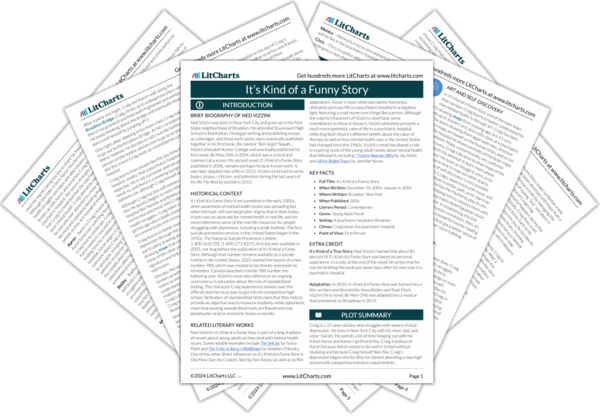In It’s Kind of a Funny Story, maps symbolize a way for Craig, who has been obsessed with maps from a young age, to navigate a path forward in life by managing the symptoms of depression instead of feeling “lost” and alone in his struggle with mental illness. One of Craig’s big breakthroughs at the psychiatric hospital happens during the art class that he takes with Joanie. Initially, Craig feels stuck and unsure of what to draw, but when he thinks back to his childhood and the things that used to give him joy, he decides to start drawing maps that look like the human brain. Drawing these maps helps Craig to better understand not just himself but also the people around him, as Craig draws brain map portraits of his fellow patients in the hospital, which deepens his relationship with them.
The process of drawing these literal maps also helps Craig to metaphorically begin to map out the rest of his life. After a conversation with Dr. Minerva, he realizes that perhaps the root cause of his depression has something to do with the ultra-competitive high school that he currently attends. He realizes then that he has the power to navigate his own future, rather than always listening to his mom and dad, and decides to look into attending an art school where he can continue the artistic journey he began when he started drawing the brain maps. Craig’s brain maps symbolize navigating mental health can be difficult, but they also point to how art and self-reflection can be ways to improve and learn to manage symptoms.
Maps Quotes in It’s Kind of a Funny Story
She got me some thick paper—white construction paper. Later on I grew to prefer straight computer paper. I went back under my fort and turned the light on and started on my first map. And I did that for the next five years—whenever I was in class, I didn’t doodle, I drew maps. Hundreds of them. When I finished, I crumpled them; it was making them that was important. I did cities on the ocean, cities with two rivers meeting in the middle, cities with one big river that bent, cities with bridges, crazy interchanges, circles and boulevards. I made cities. That made me happy. That was my Anchor. And until I turned nine and turned to video games, that was what I wanted to be when I grew up: a mapmaker.
It’s depressing, though. I mean, this room is what I expect a mental hospital to look like. Adults reduced to children, sitting with finger paints; a jolly supervisor telling them that everything they do is great.
“Ha! Listen, for real, here’s my card.” Neil pulls out a simple black-and-white business card that identifies him as a Guitar Therapist. “Whenever you’re out of here, and I’m sure it’ll be soon, give me a call and we can talk about volunteering, and—I’m serious—I might like to buy some of these.”
“You were the one who suggested I do stuff from childhood,” I continue. “I used to do these when I was a kid, and I forgot how fun they were.”












